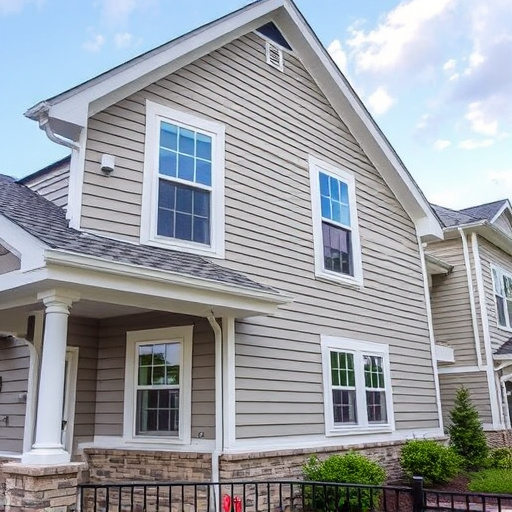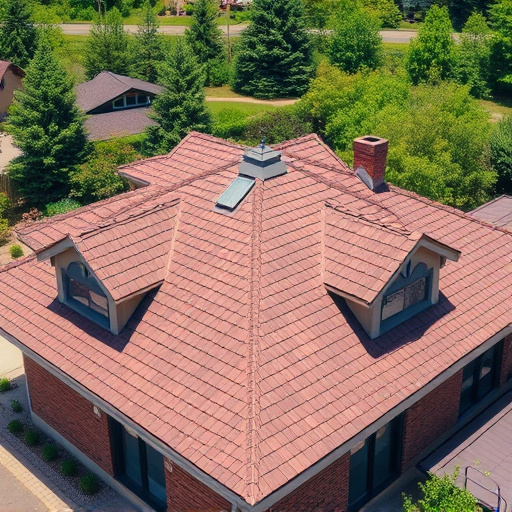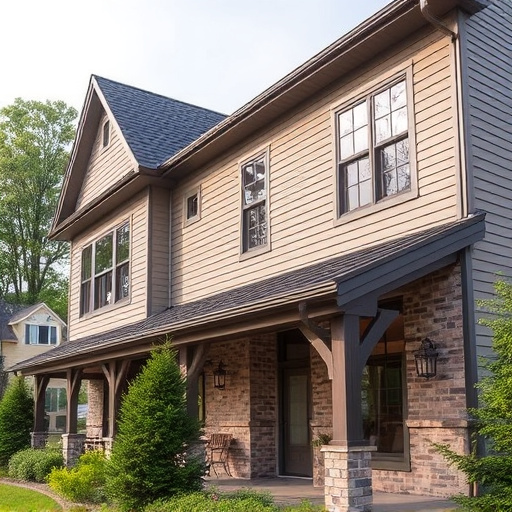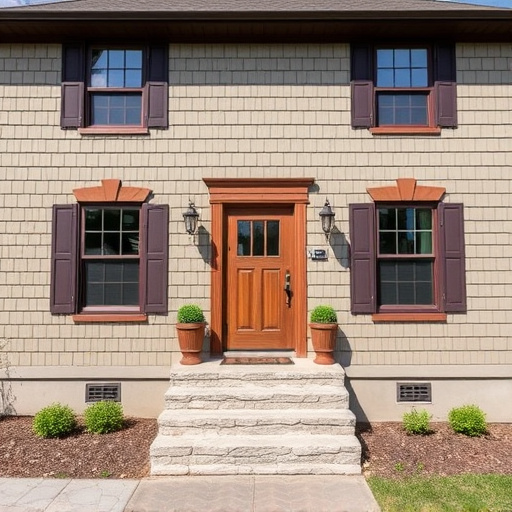Emergency Siding Repair: Trust Specialist for Quick Fix

Siding damage, from cracks to missing shingles, often goes unnoticed until extreme weather events. A…….
In the ever-evolving realm of construction and home exterior solutions, the role of a siding specialist has emerged as a pivotal player. This comprehensive article aims to dissect and explore the multifaceted world of these experts, offering readers a detailed understanding of their profession, impact, and significance in the global landscape. From defining key terms to delving into market trends, regulatory frameworks, and technological innovations, we will uncover the intricacies that shape this vital industry segment.
A siding specialist, at its essence, is a professional or a contracting firm specializing in the installation, repair, and maintenance of exterior cladding, commonly known as siding, on residential and commercial buildings. Siding serves as the protective outer layer of a structure, enhancing aesthetics, insulating properties, and structural integrity.
The core components of a siding specialist’s expertise include:
Siding Materials: This encompasses a wide range of options such as vinyl, wood, fiber cement, aluminum, steel, and brick. Each material has distinct characteristics, including durability, maintenance requirements, and visual appeal.
Installation Techniques: Specialists employ various methods and tools for installing siding, ensuring proper sealing, flashing, and trim work to create a waterproof barrier. These techniques may include housewrap installation, siding nailing or screwing, and window/door framing adjustments.
Repairs and Maintenance: They are adept at identifying and rectifying issues like cracks, rot, peeling, or damaged siding panels. Regular maintenance is crucial to ensure the longevity of the siding and the structural soundness of the building.
The practice of siding installation has deep roots in construction history. Historically, natural materials like wood were commonly used for cladding, offering both aesthetic appeal and relative ease of installation. However, with advancements in technology and an increasing demand for energy-efficient homes, the industry witnessed a shift towards more durable and low-maintenance alternatives.
Today, siding specialists play a pivotal role in:
The reach of siding specialists extends far beyond national borders, with their services in high demand across the globe. Here’s a glimpse into some key international trends:
| Region | Trending Siding Materials | Regional Preferences |
|---|---|---|
| North America | Fiber cement, vinyl | Emphasis on durability and low maintenance |
| Europe | Brick, wooden cladding | Historical preference for traditional materials |
| Asia Pacific | Vinyl, aluminum | Rapid urbanization driving demand for quick installation and cost-effectiveness |
| Latin America | Wood, vinyl | Balancing aesthetics and affordability |
These trends are shaped by factors like climate, cultural preferences, and economic conditions. For instance, regions with harsh winters might favor more durable materials, while coastal areas often require siding that can withstand high winds and salt air.
The global siding market is a significant contributor to the construction industry, with various economic factors influencing its growth:
Market Size: According to recent reports, the global siding market size was valued at USD 42.3 billion in 2020 and is projected to grow at a CAGR of 5% from 2021 to 2028. This growth is attributed to rising construction activities and the need for energy-efficient buildings.
Investment Patterns: Private equity firms and venture capitalists have shown interest in siding specialists, recognizing their role in the value chain of residential and commercial construction projects. Investments often focus on technology upgrades, expansion into new markets, and acquiring specialized equipment.
Cost Dynamics: The cost of siding materials varies widely based on type, quality, and location. For instance, fiber cement siding may be more expensive upfront but offers long-term savings due to its durability. On the other hand, vinyl is known for its affordability and ease of installation.
Technological innovations have revolutionized the way siding specialists work, improving efficiency, precision, and overall project outcomes:
3D Modeling Software: This technology allows specialists to create detailed digital replicas of buildings, enabling them to plan siding installations more accurately. It aids in identifying potential issues before they become costly on-site problems.
Advanced Siding Tools: Innovations like battery-powered nailing guns, laser guides for precise cuts, and automated flashing machines have streamlined installation processes, reducing labor costs and improving speed.
Sustainable Materials: The rise of eco-friendly siding options, such as recycled content vinyl and bio-based fiber cement, aligns with growing environmental concerns. These materials offer not only sustainability but also performance benefits like improved insulation properties.
The siding industry is subject to various policies and regulations that ensure safety, quality, and ethical practices:
Building Codes: Local and national building codes dictate minimum standards for construction, including siding materials and installation methods. These codes vary across regions but generally aim to protect public safety and property.
Environmental Regulations: Many countries have implemented regulations regarding the disposal of construction waste, promoting recycling and sustainable practices in the siding industry.
Product Safety Standards: Organizations like ASTM International and UL (Underwriters Laboratories) set standards for siding materials, ensuring their safety and performance. These standards cover aspects such as flame resistance, impact strength, and moisture resistance.
Despite its growth and advancements, the siding specialist industry faces several challenges that require strategic solutions:
Labor Shortages: The skilled labor shortage plaguing the construction industry also affects siding specialists, leading to increased competition for qualified workers and potentially impacting project timelines.
Material Cost Fluctuations: Volatile market conditions can cause price swings in siding materials, affecting profit margins and project budgeting.
Customer Education: Some homeowners may lack awareness of the importance of proper siding installation and maintenance, resulting in subpar projects or unnecessary repairs.
To address these challenges:
A leading siding specialist in Germany successfully transformed a historic city center by retrofitting traditional brick buildings with energy-efficient fiber cement siding. This project not only enhanced the aesthetic appeal but also reduced energy loss, contributing to the city’s green building initiative. The specialist utilized 3D modeling to ensure precise measurements and minimized disruption to nearby businesses during installation.
In Toronto, Canada, a local siding company pioneered the use of recycled vinyl siding on a major urban renewal project. This innovative approach not only reduced construction waste but also met the client’s budget constraints. The company partnered with local recycling facilities, ensuring a sustainable and cost-effective solution for the city’s new residential development.
As we peer into the future, several trends and considerations shape the trajectory of the siding specialist industry:
Smart Homes and IoT Integration: Siding specialists can play a role in integrating smart home technology into exterior cladding, enabling energy monitoring and efficient building management.
Customized Designs: With advancements in manufacturing, siding materials can be produced with unique designs and colors, offering homeowners greater customization options.
Off-Site Construction (Modular Buildings): The growing popularity of modular construction techniques may lead to more prefab siding solutions, potentially reducing installation times and costs.
Digitalization: Further adoption of digital technologies will streamline project management, improve communication between specialists and clients, and facilitate remote consultations.
The siding specialist industry stands at a pivotal point, shaped by technological advancements, shifting market dynamics, and evolving customer preferences. As the construction sector continues to evolve, these professionals will remain essential in ensuring the longevity, aesthetics, and energy efficiency of buildings worldwide.
By embracing innovation, staying abreast of regulatory changes, and addressing challenges through strategic collaborations, siding specialists can secure a prominent role in shaping the built environment of the future.
Q: How do I choose the right siding specialist for my project?
A: Consider their experience, licensing, insurance, and references. Request detailed proposals outlining materials, methods, timelines, and costs. Check online reviews and ask for examples of similar projects they’ve completed.
Q: What are the benefits of professional siding installation over DIY?
A: Professional installers ensure precision, follow building codes, and use high-quality materials. They also offer warranties, providing peace of mind and long-term savings by preventing costly future repairs.
Q: Are there any environmental considerations when choosing siding materials?
A: Yes, opt for sustainable materials like fiber cement, vinyl with recycled content, or metal siding from responsible sources. These choices minimize environmental impact while offering durability and low maintenance.
Q: Can siding be installed in cold weather?
A: Some siding materials and installation methods are better suited for colder climates. Professionals can use specialized techniques and materials to ensure successful installation even in freezing temperatures.
Q: How often should I inspect my siding for damage?
A: Regular inspections, especially after severe weather events, are recommended. Look for cracks, peeling, water stains, or loose panels. Promptly addressing issues will prevent minor problems from becoming major repairs.

Siding damage, from cracks to missing shingles, often goes unnoticed until extreme weather events. A…….

Regional weather patterns dictate siding choices, with harsh winters favoring durable materials like…….

Siding specialists enhance curb appeal and property value through expert installation of aesthetical…….

Siding specialists tackle harsh climates with climate-specific knowledge, recommending durable mater…….

Siding specialists protect homes from weather damage and enhance aesthetics through repairs or repla…….

A siding specialist offers expert knowledge and efficiency in handling diverse materials for durable…….

Siding specialists address residential siding issues from cosmetic to structural, beginning with tho…….

A siding specialist is key to enhancing property value and curb appeal through expert installation,…….

When choosing a contractor for home exterior work, opt for licensed siding specialists. These profes…….

Damaged siding, from cracks to missing pieces, can signal structural issues and water intrusion risk…….